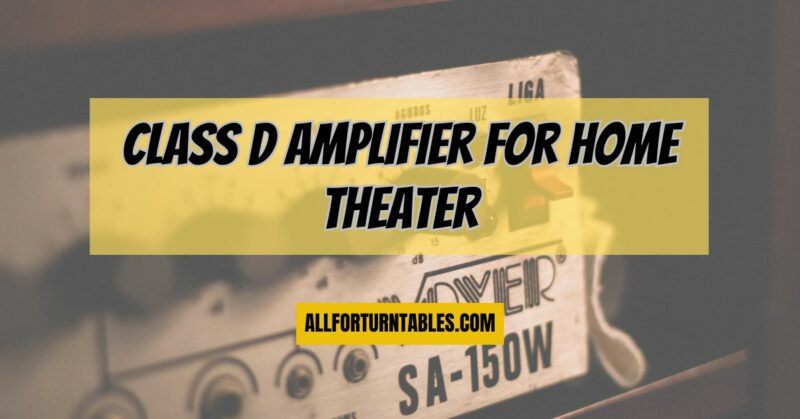When it comes to creating an immersive home theater experience, the choice of amplifier plays a crucial role. Among the various amplifier classes, Class D amplifiers have gained popularity for their efficiency and compact design. But do they sound better for your home theater? Can you use them with speakers? In this beginner-friendly guide, tailored for those aged 18-38, we’ll delve into Class D amplifiers, their performance, compatibility with speakers, their suitability for home theaters, and their common uses.
Do Class D Amplifiers Sound Better?
The question of whether Class D amplifiers sound better than other classes, like Class A or Class AB, is subjective and depends on various factors, including personal preferences and the quality of the amplifier. Here are some points to consider:
Pros of Class D Amplifiers:
- Efficiency: Class D amplifiers are highly efficient, meaning they waste less energy as heat. This efficiency can lead to cooler operation and longer lifespan.
- Compact Size: They are often smaller and lighter than other amplifier classes, making them easier to integrate into home theater setups.
- Less Heat: The reduced heat generation can be an advantage in confined spaces, as it minimizes the need for extensive cooling mechanisms.
- Energy Savings: Their efficiency can result in lower energy consumption, which is environmentally friendly and cost-effective.
Cons of Class D Amplifiers:
- Sound Quality: While modern Class D amplifiers can offer excellent sound quality, some audiophiles argue that Class A or Class AB amplifiers provide a warmer and more detailed audio experience.
- Compatibility: Not all speakers are equally compatible with Class D amplifiers, so choosing the right speaker-amplifier combination is essential.
Can I Use a Class D Amplifier for Speakers?
Yes, you can use a Class D amplifier with speakers, but compatibility is key. Class D amplifiers are versatile and can be a great match for various speaker types, including bookshelf speakers, tower speakers, and even subwoofers. However, it’s crucial to ensure that the impedance and power handling capabilities of your speakers match those of the amplifier.
Which Class Amplifier Is Best for Home Theater?
The choice of amplifier class for your home theater depends on your priorities:
- Class D Amplifiers: These are an excellent choice for home theaters where energy efficiency and compact size are crucial. They work well with a wide range of speakers and can provide impressive sound quality when matched correctly.
- Class A or Class AB Amplifiers: If you prioritize audiophile-grade sound quality and are willing to accept the trade-off of higher energy consumption and heat generation, Class A or Class AB amplifiers may be preferable.
- AV Receivers: Many home theaters opt for AV receivers that include built-in amplifiers. These receivers often use a combination of amplification classes to balance power, efficiency, and sound quality.
What Is a Class D Amplifier Used For?
Class D amplifiers find applications in various audio systems, including:
- Home Theaters: Class D amplifiers are commonly used in home theater setups to power speakers and subwoofers. Their efficiency and compact size make them a popular choice.
- Car Audio: Class D amplifiers are prevalent in car audio systems due to their ability to deliver substantial power in a small form factor, making them ideal for car amplifiers.
- Portable Audio: Many portable audio devices, such as Bluetooth speakers and headphones, use Class D amplifiers to maximize battery life and reduce heat.
- Professional Audio: Class D amplifiers are also used in professional audio equipment like power amplifiers for sound reinforcement systems.
In conclusion, Class D amplifiers offer a compelling choice for home theaters, thanks to their efficiency, compact size, and compatibility with various speakers. Whether they sound “better” than other amplifier classes depends on personal preferences and the specific components used. When selecting an amplifier for your home theater, consider factors like your priorities for sound quality, energy efficiency, and speaker compatibility to make the right choice for your audio setup.


